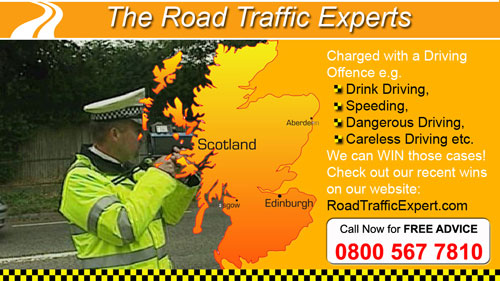GlasgowLive Article
Why Scotland's speed awareness course could increase motoring offences.
Why Scotland's speed awareness course could increase motoring offences Mr Technicality - top lawyer Richard Freeman - on why the introduction of a speed awareness course is a poisoned chalice for Scotland.

Police Scotland now have permission to start working on the introduction of a speeding awareness course as an alternative to prosecuting speeding cases in Scotland.
The Crown Office has provided its consent in an attempt to curb the year-on-year rise in the number of offences committed.
But would such a course benefit Scottish motorists? I doubt it. In my view it could have the opposite effect.
In England these courses have been available for some time.
In 2015 over 1.2 million drivers chose to go on one, as an alternative to receiving fixed penalty points and a fine.
For example a driver who is caught at between 35-42 MPH in a 30 zone. Or between 75-86 MPH on the motorway. And therein lies the problem for Scottish motorists.
Police here rarely prosecute a driver for speeding if he or she is caught at between 33 and 39 MPH in a 30 zone. The same range applies in the 40 and 50 zones and on motorways. If we follow the English example, increasing numbers of Scots drivers who are just slightly above the speed limits will be prosecuted in future. These drivers currently would not face any action. Will we follow the English example? It would be strange if we don't. Legally it would be difficult for both jurisdictions to justify offering the same Speed Awareness Course, but based on different levels of offending.
And it is possible that the rules here may be enforced in a stricter way than down south. The alcohol thresholds governing drink-drive offences in Scotland are much tougher than in England. There is a danger therefore that the introduction of a speed awareness course in Scotland could bring with it the issue of fixed penalty tickets for minor speeds that are currently below the fixed penalty threshold. In England a speed awareness course is not offered to motorists who have offended within the last three years. If this is followed in Scotland a driver sitting on any live penalty points would not be allowed on the course. So someone with 9 points on their licence, for example, could not opt to do the course to avoid a ban under the totting up provisions.
From a public protection perspective a speed awareness programme would be targeting the wrong people, ie the low speed offenders. For the motorist it would bring with it the potential for more fixed penalties. We ought therefore to be careful what we wish for.
We Cover All of Scotland
 All of Scotland Covered:
All of Scotland Covered:
Including: Glasgow Edinburgh Aberdeen Dundee Dumfries Paisley East Kilbride Perth Livingston Giffnock Cumbernauld Hamilton Kirkcaldy Dunfermline Ayr Kinross Kilmarnock Inverness Greenock Inverclyde Port Glasgow Coatbridge North Lanarkshire Glenrothes Fife Airdrie Falkirk Stirling Rutherglen Dumfries Galloway Motherwell Wishaw Clydebank West Dunbartonshire Bearsden East Dunbartonshire Cambuslang Newton Mearns East Renfrewshire Bishopbriggs Musselburgh East Lothian Arbroath Angus Polmont Elgin Renfrew Renfrewshire Alloa Bellshill Clackmannanshire Blantyre Dumbarton West Dunbartonshire Kirkintilloch Clarkston
East Renfrewshire Bathgate West Lothian Stenhousemuir Falkirk Peterhead Aberdeenshire Barrhead
Grangemouth Falkirk St Andrews Kilwinning Ayrshire Viewpark Buckhaven Penicuik Midlothian Stranraer Johnstone Erskine Larkhall Moray



